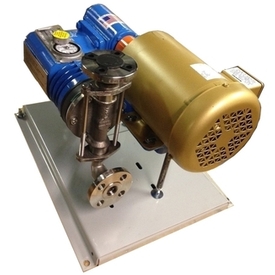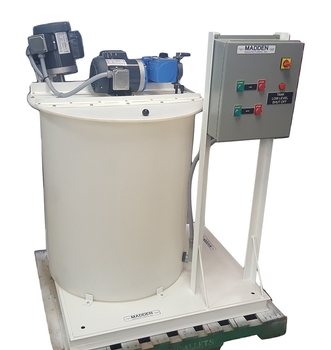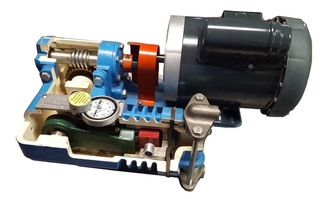Chemical metering is the act of adding chemicals into another process at a repeatable and consistent rate. The consistent and repeatable aspect is what distinguishes this process from any other type of fluid transfer process; there are hundreds of applications requiring the transfer of liquid from point A to B, none require the consistency and accuracy at the
 level chemical metering does. Too much of a chemical being metered into a water line could cause it to be more acidic or basic than is safe, too much of a chemical being metered can completely alter the result of a liquid application that is intended to create a new substance; and vice versa, under metering of a chemical can be just as detrimental to the process at hand.
level chemical metering does. Too much of a chemical being metered into a water line could cause it to be more acidic or basic than is safe, too much of a chemical being metered can completely alter the result of a liquid application that is intended to create a new substance; and vice versa, under metering of a chemical can be just as detrimental to the process at hand.
The best pumps for chemical metering are often diaphragm type metering pumps. This article will continue to go over chemical metering applications, what they are and when you will see them, as well as why chemical metering pumps are the most appropriate for this type of application, and how they work to be so.
Common chemical metering applications
At Madden Pump we see many different chemical metering application inquiries. There are hundreds of reasons/applications that call for consistent and repeatable dosing of a chemical, for the sake of this article, here are the top 5 most common applications we deal with:
- Water treatment – PH level
- Water treatment – coagulating/flocculating impurities
- Water treatment – chemicals for enhancement/treatment
- Oil and Gas Industry – general fuel additives
- Zinc, Copper, Gold Mining – ore processing applications
Water Treatment – PH level
When it comes to waste water treatment applications, whether it be municipal water or industrial plants treating their own water, PH balancing is a mainstay. If water were to remain very acidic, or very alkaline, processing equipment would start to suffer. High or low PH levels can damage equipment, corrode piping, and at certain levels they are a general danger to contact.
Often times our chemical metering pumps are metering sulfuric acid or caustic soda to help balance PH levels. Sulfuric acid helps reduce high alkalinity, and caustic helps neutralize acidic water. There are many other chemicals that can be used to balance PH, but these are (2) of the most common. Sulfuric Acid and Caustic Soda are corrosive chemicals and can be hard to handle for some materials. Diaphragm metering pumps are well suited for this as they can offer a wide range of wetted end material set ups, but we’ll get into this further in the next section.
Water Treatment – Coagulating/Flocculating
Waste water, or water in general can be contaminated with small particles and other impurities. The act of coagulating, or flocculating, in general is the process of metering a chemical into the water which helps these impurities and particles cling together and settle within the water making it much easier to remove them. Polymers would be a common flocculent used in most waste water treatment plants. Polymers can be more viscous than other water treatment chemicals, and yet again diaphragm metering pumps can be tailored to handle this better than other pump designs.
Water Treatment – enhancement/general treatment

Oil and Gas – Fuel additives
Fuel additives in the Oil and Gas industry cover a broad range of specific applications within this general category. Metering pumps are used throughout these plants, including water treatment as well.
Zinc, Copper, Gold Mining – Ore Processing Applications
In general, these mining applications are removing these precious metals from the ore (rock) and chemicals play a large roll in this. Much like the oil and gas applications, this is a broad topic with many different chemical metering processes within it; one being, you guessed it, also water treatment.
No matter the application, whether common or unique, chemical metering is a pertinent process. Now let’s talk briefly about why diaphragm type chemical metering pumps are so well suited for chemical metering applications.
Why diaphragm type chemical metering pumps are the best suited for metering
There are many reasons diaphragm type metering pumps are one of the most common and appropriate pump designs for injecting chemicals at a consistent rate but for the sake of this article we’ll stick with the two most important reasons. Wetted end material flexibility, and the actuating process of the diaphragm and inlet/outlet valves.
Wetted End Material Flexibility
This is as simple as it sounds, diaphragm type metering pumps offer a wide range of materials to allow for a durable wetted end no matter the chemical being metered. Let’s quick break down what we mean by the “wetted end”. The wetted end is term used to describe the pumping head on the chemical metering pump, it includes the diaphragm, the pump head itself, and the valve assembly.
Because these are all separate components, it allows manufacturing processes to easily make each piece in multiple materials. For example, Madden Pump offers these following options in their wetted end (slight variation possible between models):
- Solution Head Materials: PVC, Polypropylene, Teflon, and 316 SS
- Diaphragms: Neoprene, Hypalon, Viton, and Teflon faced
- Valve Seats and Balls: Neoprene, Hypalon, Viton, Teflon, and 316 SS. The valve balls are also available in Ceramic and Hastelloy C.Between all of these materials, and the different ways you can pair them up, our chemical metering pumps have never had to turn down a chemical for material compatibility reasons.
The Pumping or Actuating Process
|
|
| Madden Pump’s MF Series Chemical Metering Pump Cutaway, Parts Exposed |
Let’s take this back to the very beginning of the article, chemical metering is adding chemicals into a process at a consistent and repeatable rate. A controlled, and accurate rate. So how does a diaphragm metering pump ensure its flow rate will be consistent and repeatable with +/- 1% accuracy? It is in the controlled, precise stroke of the diaphragm and the check valve style inlet and outlet.
Here is how a diaphragm metering pump pumps chemicals: normally the driving force is an electric motor, this motor turns a worm gear and sprocket at a certain ratio of the motor’s rpm’s. As a result, a drive shaft spins at a precise speed which allows the rod and piston to maintain a precise amount of strokes per minute. More easily put, the diaphragm will have a precise amount of strokes per minute, never fluctuating barring damage to the pump, due to this geared design.
The backward and forward stroke of the diaphragm then works hand in hand with the inlet and outlet valves. Our valves are a ball and seat style check valve. As the diaphragm draws back, the bottom inlet valve unseats its ball and allows a specific, finite amount of chemical into the head of the pump. At the same time, the outlet on top will have its ball seated firmly making sure no chemical will pass through the pumping head nor will it allow chemical back into the pump head from the discharge line. Then, as the pump strokes forward, the opposite happens, the bottom valve seats firmly making sure extra chemical cannot enter and no chemical in the pump head will back track, as the top valve seat opens allowing this precise, finite amount of chemical to discharge.
This pumping process actuates over and over and over again for the service life of the pump. Madden Pump specializes in a diaphragm metering pump design built for 24/7/365 pumping with excellent service life. Our design is focused on minimizing potential downtime and maintenance that can inherently occur in these applications.
Conclusion
If you want to learn more our chemical metering applications, or specifically about our chemical metering pumps, please feel free to give us a call or an email, or reach out to one of our local distributors in your area. We would love to help discuss your chemical metering application and all of the equipment you may want to consider to keep your application running smoothly.


[…] What is Chemical Metering and When is it Needed? by Madden Pump 06/14/2019… This article discuss the process of metering chemicals in various applications. We go over where you’ll see these applications, why chemical metering is needed, and why diaphragm type metering pumps are the best design for injecting chemicals. […]